Sick Bacchus (Self-Portrait as Bacchus), c.1592/93 Michelangelo Merisi da Caravaggio (1571-1610)
Location: Galleria Borghese Rome ItalyOriginal Size: 67 x 53 cm
Own a museum-quality reproduction of Sick Bacchus (Self-Portrait as Bacchus) by Caravaggio (c.1592/93), exclusively hand-painted in oils on linen canvas by European artists with academic training. Each masterpiece is created with meticulous craftsmanship, capturing the exceptional quality and authentic brushwork of the original painting.
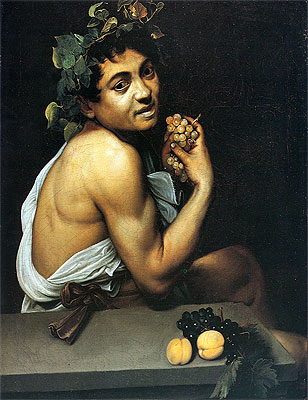
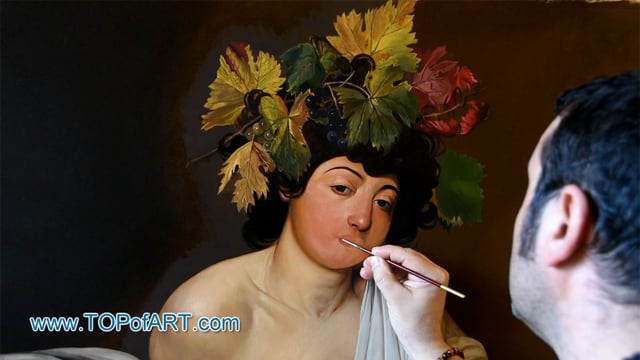
Recreating Caravaggio: A Video Journey into Museum-Quality Reproductions by TOPofART
Video showcasing the process of hand-painting a Caravaggio masterpiece with the utmost precision and care for detail.
Oil Painting Reproduction
If you want a different size than the offered
Description
Painted by European Аrtists with Academic Education
Museum Quality
+ 4 cm (1.6") Margins for Stretching
Creation Time: 8-9 Weeks
Creation Process
We create our paintings with museum quality and covering the highest academic standards. Once we get your order, it will be entirely hand-painted with oil on canvas. All the materials we use are the highest level, being totally artist graded painting materials and linen canvas.
We will add 1.6" (4 cm) additional blank canvas all over the painting for stretching.
High quality and detailing in every inch are time consuming. The reproduction of Michelangelo Merisi da Caravaggio also needs time to dry in order to be completely ready for shipping, as this is crucial to not be damaged during transportation.
Based on the size, level of detail and complexity we need 8-9 weeks to complete the process.
In case the delivery date needs to be extended in time, or we are overloaded with requests, there will be an email sent to you sharing the new timelines of production and delivery.
TOPofART wants to remind you to keep patient, in order to get you the highest quality, being our mission to fulfill your expectations.
We not stretch and frame our oil paintings due to several reasons:
Painting reproduction is a high quality expensive product, which we cannot risk to damage by sending it being stretched.
Also, there are postal restrictions, regarding the size of the shipment.
Additionally, due to the dimensions of the stretched canvas, the shipment price may exceed the price of the product itself.
You can stretch and frame your painting in your local frame-shop.
Delivery
Once the painting Sick Bacchus (Self-Portrait as Bacchus) is ready and dry, it will be shipped to your delivery address. The canvas will be rolled-up in a secure postal tube.
We offer free shipping as well as paid express transportation services.
After adding your artwork to the shopping cart, you will be able to check the delivery price using the Estimate Shipping and Tax tool.
Museum Quality
The paintings we create are only of museum quality. Our academy graduated artists will never allow a compromise in the quality and detail of the ordered painting. TOPofART do not work, and will never allow ourselves to work with low quality studios from the Far East. We are based in Europe, and quality is our highest priority.
Additional Information
The color palette is largely subdued, dominated by dark browns and greens that create a somber mood. The measured use of cool highlights on his skin underscores the subject’s pallor, hinting at Caravaggio’s own illness at the time. Here, the restraint in chromatic intensity intensifies the sensation of unease; the composition quietly compels the viewer to notice every tint of yellowish and greenish hue in the subject’s flesh, which speaks of convalescence rather than robust vitality.
A noteworthy feature of Caravaggio’s early technique is evident in the sharp delineation of form and detail. The face and torso are modeled with direct, focused strokes, but one still observes a meticulous attention to light and shadow that soon became a hallmark of his mature style. This painting also shows a young painter determined to display his skill in capturing realistic textures. The fruit is rendered with a certain precision: the soft bloom of the grapes contrasts with the taut flesh of the apricots, although the overall finish remains somewhat less polished than in Caravaggio’s later work.
The composition is spare yet careful. The plain background acts as a foil for both the figure and the natural elements. The diagonal line of the subject’s body draws the eye from the masked expression on his face down toward the arrangement of fruit, uniting portrait and still-life in a single, cohesive plane. The overall effect is intimate but slightly unsettling, as though the viewer has intruded upon a private moment.
Painted when Caravaggio was likely recovering from illness in Rome, this canvas reflects the early baroque fascination with heightened realism and the direct portrayal of physical states. It marks a transitional moment in his trajectory: while it exhibits the fluency with light that would define his later style, it also discloses a personal vulnerability. In this complex portrayal, the mythic figure of Bacchus is transformed into something convincingly mortal and fragile.
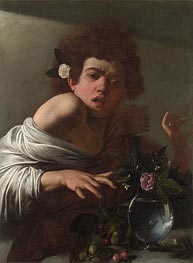
Boy Bitten by a Lizard c.1595/00
$2646
$101.08
Michelangelo Merisi da Caravaggio
Original Size:66 x 49.5 cm
National Gallery, London, UK
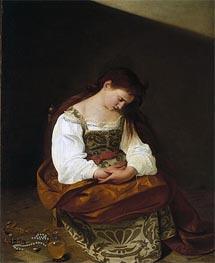
Penitent Magdalen c.1598
$2810
$127.62
Michelangelo Merisi da Caravaggio
Original Size:122.5 x 98.5 cm
Galleria Doria Pamphilj, Rome, Italy
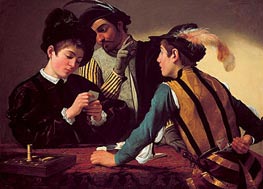
The Cardsharps (I Bari) c.1595/96
$4168
$67.38
Michelangelo Merisi da Caravaggio
Original Size:90 x 112 cm
Kimbell Art Museum, Fort Worth, USA
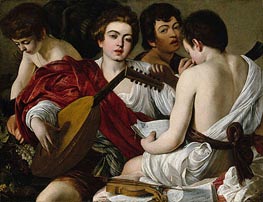
The Musicians (Concert) c.1594/95
$4362
$71.30
Michelangelo Merisi da Caravaggio
Original Size:92.1 x 118.4 cm
Metropolitan Museum of Art, New York, USA
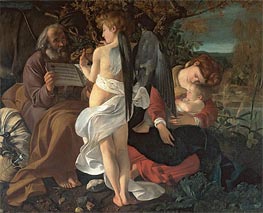
The Rest on the Flight into Egypt c.1595
$5119
$125.65
Michelangelo Merisi da Caravaggio
Original Size:135.5 x 166.5 cm
Galleria Doria Pamphilj, Rome, Italy